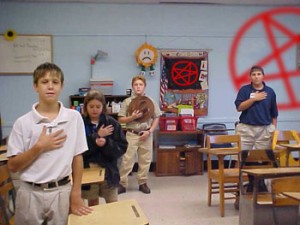 Reading Nathan’s and Theodore’s thoughtful considerations of this important parenting question, I quivered with fear: Really? This is the shit I’m going to have to face with Sasha two years from now?
Reading Nathan’s and Theodore’s thoughtful considerations of this important parenting question, I quivered with fear: Really? This is the shit I’m going to have to face with Sasha two years from now?
Frankly, it all feels highly theoretical, and that’s probably because I have absolutely no experience with gifted-and-talented programs. Neither of the public school systems I attended—in Amherst, Massachusetts, and Williamsburg, Virginia—had such programs, or if they did, my parents hid their existence from me pretty well.
Which is not to say there wasn’t tracking, or the sense that some kids were ahead of others (or way behind). In Virginia, we had a “magnet school” for students interested in advanced physics or something. That sounds like the kind of thing I would’ve done, but I didn’t. I was too busy taking advanced calculus classes over at William & Mary.
Here’s how that happened: I spent my first 10 years of public school as a pretty bright but not top-of-the-class student in Amherst, where the sheer number of professors’ kids (a.k.a. faculty brats) ensured a highly competitive atmosphere. I did well, more out of my own initiative than anything else (I think), but there were problems along the way: In fifth grade, my hatred of writing—the actual physical act of writing—got me temporarily placed in the slow Language Arts class. In eighth grade, I just wasn’t getting the idea of “generalizations” in History, and was in danger of failing. Nothing catastrophic, and I’m sure all kids go through such issues at one time or another.
Then, just before tenth grade, we moved to Williamsburg, which had its share of smart students and good schools but just wasn’t as competitive as Amherst, where ambition had always been palpable. Pretty quickly, I found myself standing out in this crowd, and easily able to convince teachers to let me pursue independent studies in math and computers (i.e., to print out reams of bad jokes downloaded from local BBSes). I didn’t waste time letting the school teach me what it felt like teaching me; instead, I figured out how to bend the system to my advantage. I guess it worked: I got into a good college, which is what this is all about, right?
So, my advice: Forget about gifted-and-talented. You’re much better off bringing your kids up in a good, highly competitive school system, then moving them to a pretty good but less competitive system, where their well-developed competitive instincts will let them dominate their peers.
Or maybe G&T programs have a part to play here. After all, where else in a massive school system like New York’s are you going to find the peer competition that will push your child to excel in the early years? Maybe it comes from the parents, maybe from the kids themselves, but in the end it doesn’t matter. A self-selecting (sort of) group of high achievers is good training. (Unless, of course, those numbers Nathan cited mean anything.) But don’t stay in the program forever. There’s more to school than hanging out with nerds.

The school would have a bus pick up the “advanced” kids where I went to school in the morning and take them to a far off place. When they returned they would fill us common folk with stories of frankenstein experiments with rabbits and NASA like launches of rockets. Yeah, I was jealous then until I heard the recess bell and then would try to forget about it as soon as four square started. The gifted program might have pushed the “advanced” kids harder to explore their talent but it certainly made me feel like I didn’t belong with them. I think it gave me “you have to work harder than everyone else” attitude…which probably wasn’t bad. And I certainly enjoyed slamming them with that red,rubber playground ball or kickin their ass in tetherball.